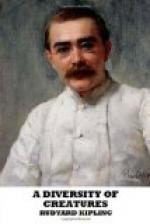’After ceremonies had been accomplished, and word had gone out to the Kings of the Earth that they should come and mourn, the new King—the dead King’s son—gave commandment that his father’s body should be laid, coffined, in a certain Temple which is near the river. There are no idols in that Temple; neither any carvings, nor paintings, nor gildings. It is all grey stone, of one colour as though it were cut out of the live rock. It is larger than—yes, than the Durbar Sahib at Amritsar, even though the Akal Bunga and the Baba-Atal were added. How old it may be God knows. It is the Sahibs’ most sacred Temple.
’In that place, by the new King’s commandment, they made, as it were, a shrine for a saint, with lighted candles at the head and the feet of the Dead, and duly appointed watchers for every hour of the day and the night, until the dead King should be taken to the place of his fathers, which is at Wanidza.
’When all was in order, the new King said, “Give entrance to all people,” and the doors were opened, and O my uncle! O my teacher! all the world entered, walking through that Temple to take farewell of the Dead. There was neither distinction, nor price, nor ranking in the host, except an order that they should walk by fours.
’As they gathered in the streets without—very, very far off—so they entered the Temple, walking by fours: the child, the old man; mother, virgin, harlot, trader, priest; of all colours and faiths and customs under the firmament of God, from dawn till late at night. I saw it. My Colonel gave me leave to go. I stood in the line, many hours, one koss, two koss, distant from the temple.’
‘Then why did the multitude not sit down under the trees?’ asked the priest.
‘Because we were still between houses. The city is many koss wide,’ the Havildar-Major resumed. ’I submitted myself to that slow-moving river and thus—thus—a pace at a time—I made pilgrimage. There were in my rank a woman, a cripple, and a lascar from the ships.
’When we entered the Temple, the coffin itself was as a shoal in the Ravi River, splitting the stream into two branches, one on either side of the Dead; and the watchers of the Dead, who were soldiers, stood about It, moving no more than the still flame of the candles. Their heads were bowed; their hands were clasped; their eyes were cast upon the ground—thus. They were not men, but images, and the multitude went past them in fours by day, and, except for a little while, by night also.
’No, there was no order that the people should come to pay respect. It was a free-will pilgrimage. Eight kings had been commanded to come—who obeyed—but upon his own Sahibs the new King laid no commandment. Of themselves they came.
’I made pilgrimage twice: once for my Salt’s sake, and once again for wonder and terror and worship. But my mouth cannot declare one thing of a hundred thousand things in this matter. There were lakhs of lakhs, crores of crores of people. I saw them.’




